人教版英语七年级下册-unit1单元知识背记手册
完整版人教版七年级下册英语第一单元必背课文、单词与语法梳理
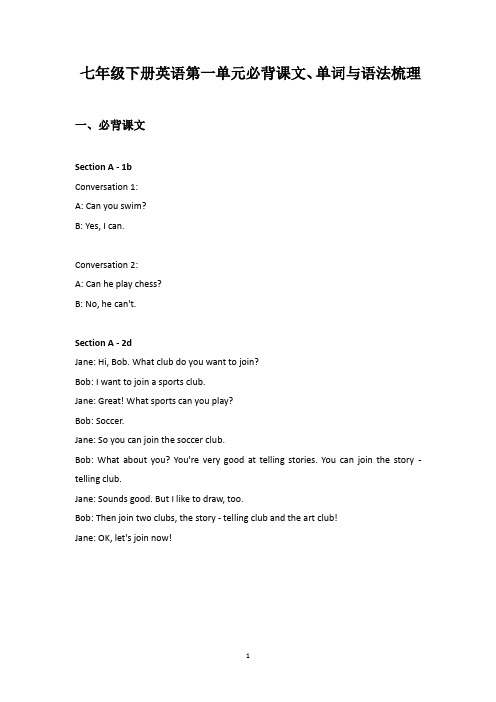
七年级下册英语第一单元必背课文、单词与语法梳理一、必背课文Section A - 1bConversation 1:A: Can you swim?B: Yes, I can.Conversation 2:A: Can he play chess?B: No, he can't.Section A - 2dJane: Hi, Bob. What club do you want to join?Bob: I want to join a sports club.Jane: Great! What sports can you play?Bob: Soccer.Jane: So you can join the soccer club.Bob: What about you? You're very good at telling stories. You can join the story -telling club.Jane: Sounds good. But I like to draw, too.Bob: Then join two clubs, the story - telling club and the art club!Jane: OK, let's join now!Section B - 2bWelcome to the Students' Sports Center. We have many sports clubs. Do you like playing tennis? It's a great sport. We have great tennis coaches. They can teach you how to play tennis well. Or do you like swimming? We have a big swimming pool. You can swim like a fish here. If you like basketball, we also have a basketball club. Our coaches are very good. They can help you be a better basketball player. And for those who like running, we have a running club. Come and join us!二、重点单词1. guitar:[ɡɪˈtɑː(r)] n. 吉他;六弦琴2. sing:[sɪŋ] v. 唱;唱歌3. swim:[swɪm] v. 游泳;n. 游泳4. dance:[dɑːns] v. 跳舞;n. 舞蹈;舞会5. draw:[drɔː] v. 画;拉;吸引6. chess:[tʃes] n. 国际象棋;西洋棋7. play chess:下国际象棋8. speak:[spiːk] v. 说(某种语言);说话;发言;演讲9. speak English:说英语10. join:[dʒɔɪn] v. 参加;加入;连接;会合11. club:[klʌb] n. 俱乐部;社团;棍棒;(纸牌中的)梅花12. be good at...:擅长于……13. tell:[tel] v. 讲述;告诉;吩咐;辨别;产生效果14. story:[ˈstɔːri] n. 故事;小说;新闻报道;来历;假话15. write:[raɪt] v. 写;书写;写作;作曲;写信16. show:[ʃəʊ] v. 表明;证明;给……看;出示;演出;展示;n. 演出;节目;展览;展览会17. or:[ɔː(r)] conj. 或者;还是;否则;不然;大约;左右;prep. 在……之前;在……情况下;用于否定句中代替and18. talk:[tɔːk] v. 说话;交谈;谈话;讨论;n. 交谈;谈话;演讲;空谈;谣言19. talk to...:跟……说20. kung fu:[ˌkʌŋ ˈfuː] n. 功夫;中国功夫21. drum:[drʌm] n. 鼓;鼓声;v. 击鼓;连续敲击;反复强调22. play the drums:敲鼓23. piano:[piˈænəʊ] n. 钢琴24. play the piano:弹钢琴25. violin:[ˌvaɪəˈlɪn] n. 小提琴26. play the violin:拉小提琴27. also:[ˈɔːlsəʊ] adv. 也;而且;同样28. people:[ˈpiːpl] n. 人;人们;人民;民族;种族;v. 居住于;使住满人29. home:[həʊm] n. 家;家庭;家乡;本国;adj. 家庭的;国内的;有效的;adv. 在家;回家;在本国;深深地30. make:[meɪk] v. 制作;制造;使成为;使产生;准备;整理;引起;构成;总计;等于;n. (机器、设备等的)品牌;型号31. make friends:交朋友32. today:[təˈdeɪ] n. 今天;现今;adv. 在今天;当今33. center:[ˈsentə(r)] n. 中心;中央;中锋;(活动、兴趣等的)集中点;v. 把……集中于;使聚集在……34. weekend:[ˌwiːkˈend] n. 周末;周末假期;vi. 度周末35. teach:[tiːtʃ] v. 教;教导;教授;讲授;教训;告诫;n. 教师;导师;学说36. musician:[mjuːˈzɪʃn] n. 音乐家;乐师;作曲家三、语法知识点1. 情态动词can 的用法-表示能力:can 表示某人“能、会”做某事,没有人称和数的变化,后面接动词原形。
人教版七年级下册英语unit1、unit2笔记
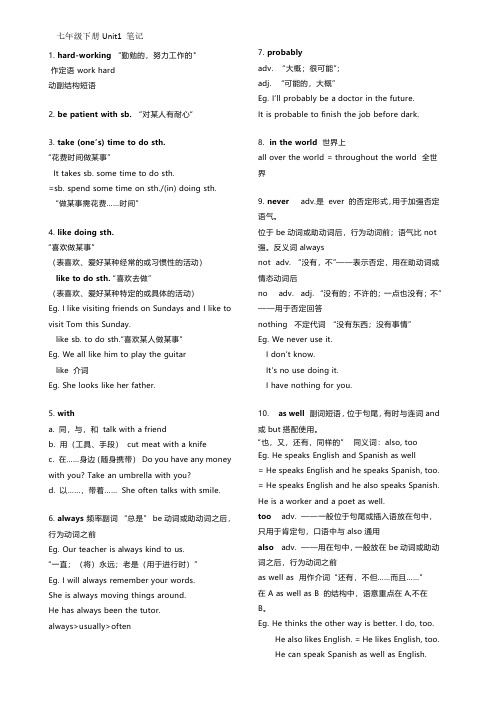
1.hard-working“勤勉的,努力工作的"作定语work hard动副结构短语2.be patient with sb.“对某人有耐心“3.take(one’s)time to do sth.“花费时间做某事”It takes sb.some time to do sth.=sb.spend some time on sth./(in)doing sth.“做某事需花费……时间”4.like doing sth.“喜欢做某事”(表喜欢、爱好某种经常的或习惯性的活动)like to do sth.“喜欢去做”(表喜欢、爱好某种特定的或具体的活动)Eg.I like visiting friends on Sundays and I like to visit Tom this Sunday.like sb.to do sth.“喜欢某人做某事”Eg.We all like him to play the guitarlike介词Eg.She looks like her father.5.witha.同,与,和talk with a friendb.用(工具、手段)cut meat with a knifec.在……身边(随身携带)Do you have any money with you?Take an umbrella with you?d.以……,带着……She often talks with smile.6.always频率副词“总是”be动词或助动词之后,行为动词之前Eg.Our teacher is always kind to us.“一直;(将)永远;老是(用于进行时)”Eg.I will always remember your words.She is always moving things around.He has always been the tutor.always>usually>often 7.probablyadv.“大概;很可能”;adj.“可能的,大概”Eg.I’ll probably be a doctor in the future.It is probable to finish the job before dark.8.in the world世界上all over the world=throughout the world全世界9.never adv.是ever的否定形式,用于加强否定语气。
七年级人教版英语下册unit1知识点总结

七年级人教版英语下册unit1知识点总结英语作为一门重要的语言学科,每年都有大量的学生选择学习。
对于初学者来说,了解知识点是非常重要的。
本文旨在总结七年级人教版英语下册Unit 1的知识点,帮助学生更好地掌握此单元内容。
一、动词“be”1. be动词的基本形式是“am/is/are”,用来描述人或事物的状态或特征。
2. “am”通常用于第一人称单数,如“I am a student”;“is”用于第三人称单数,如“He is a teacher”;“are”用于第二人称单数和复数,如“You are my friend”和“They are students”。
3. be动词可以改变时态,如过去时“was/were”和将来时“will be”。
4. be动词也可以用于形容词后面,表示状态或特征,如“Thesky is blue”和“The book is interesting”。
二、人称代词1. 人称代词分为主格和宾格,分别在主语和宾语中使用。
2. 主格代词包括“I/you/he/she/it/we/they”,而宾格代词包括“me/you/him/her/it/us/them”。
3. 使用人称代词时需注意时态和单复数的变化。
4. 人称代词可以在句子中替代名词或名词短语,以避免重复使用同一个词语。
三、名词单复数1. 名词单数通常以“-s/-es”结尾,如“book/books”和“box/boxes”。
2. 常见的特殊名词变化包括:“man/men”、“child/children”、“tooth/teeth”、“foot/feet”和“mouse/mice”。
3. 有些名词不以“-s/-es”结尾,如“sheep”和“fish”,它们在单数和复数形式相同。
四、形容词1. 形容词用来描述名词的特征和状态,通常放在名词前面,如“a blue car”和“a tall building”。
2. 形容词有三个级别:原级、比较级和最高级。
人教版七年级下册英语Unit 1 知识点语法归纳总结

人教版七年级下册英语Unit 1 知识点语法归纳总结Unit 1 What’s the matter?1.短语归纳2.典句必背3.用法集萃(1)当别人心情不好,身体不适或遇到麻烦时,我们可以用如下表达表示关心:❖What’s the matter?❖What’s the matter with you?❖What’s wrong with …?❖What’s the trouble\problem with …?(2)英语中常用have描述身体的不适,此时have意为“患有”,常用结构:①have a + 疾病例:have a cold 感冒;have a fever 发烧;have a cough 咳嗽②have a + 身体部位-ache例:have a headache 头痛;have a toothache 牙痛③have a sore + 身体部位例:have a sore throat 咽喉痛;have a sore back 背痛(3)lie down躺下;tell lies/a lie 说谎(4)maybe & may be①maybe,“或许”,常用于句首,表示可能性,后加句子。
例:Maybe you are right.②may be,是情态动词+be的结构,意为“可能,也许”,后加名词、代词或形容词。
例:He may be angry.(5)sound like & sound①sound like+名词/代词/从句例:It sounds like you don’t know the truth. It sounds like a good idea.②sound+形容词,“听起来,好像”,例:The music sounds nice.(6)…when the driver saw an old man lying on the side of the road. ……这时司机看到意为老人躺在路边。
七年级下册英语第一单元课堂笔记人教版
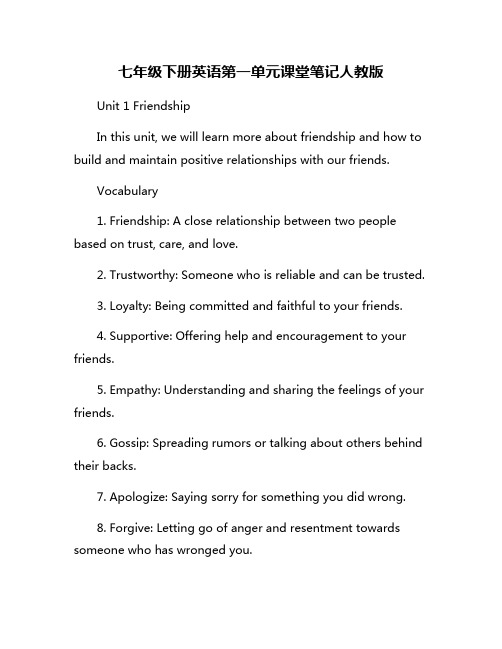
七年级下册英语第一单元课堂笔记人教版Unit 1 FriendshipIn this unit, we will learn more about friendship and how to build and maintain positive relationships with our friends.Vocabulary1. Friendship: A close relationship between two people based on trust, care, and love.2. Trustworthy: Someone who is reliable and can be trusted.3. Loyalty: Being committed and faithful to your friends.4. Supportive: Offering help and encouragement to your friends.5. Empathy: Understanding and sharing the feelings of your friends.6. Gossip: Spreading rumors or talking about others behind their backs.7. Apologize: Saying sorry for something you did wrong.8. Forgive: Letting go of anger and resentment towards someone who has wronged you.9. Conflict: A disagreement or argument between friends.10. Compromise: Finding a solution that works for both sides in a conflict.Grammar1. Present Simple Tense: Used to talk about routines, habits, and general truths.Example: I play soccer with my friends every Saturday.2. Present Continuous Tense: Used to talk about actions happening right now or in the near future.Example: I am meeting my friend for lunch tomorrow.3. Adverbs of Frequency: Used to talk about how often something happens.Example: I sometimes go shopping with my friends on weekends.4. Expressing preference with "like" and "love"Example: I like playing video games with my friends.5. Expressing obligation with "have to"Example: I have to call my friend to apologize for being late.Reading and WritingWe will read stories, dialogues, and letters about friendships to understand how to communicate effectively, resolve conflicts, and show empathy towards our friends.Listening and SpeakingWe will listen to conversations, interviews, and songs about friendship and participate in discussions, role-plays, and presentations to improve our listening and speaking skills.Homework1. Write a paragraph about a time when a friend helped you in a difficult situation.2. Create a dialogue between two friends who are apologizing to each other after a disagreement.3. Listen to a song about friendship and write a reflection on its meaning to you.Let's work together to build strong and lasting friendships with our classmates and friends!。
人教版七年级下册英语第一单元知识点汇总

人教版七年级下册英语第一单元知识点汇总◆重点短语◆重点句子◆重点单词变形二、语法知识点A部分知识点1、情态动词can的用法情态动词是动词的一种,表示说话人的语气和情态等,有一定的意义,不能单独做谓语,必须要和实义动词或者系动词连用构成谓语。
can是一个情态动词。
表示说话人的主观看法或语气,它没有人称和数的变化,也不能单独在句子中作谓语,但它可以与其后的不带to的动词不定式一起构成谓语。
❶情态动词can在陈述句中多表示做某事的能力“能,会”,或者推测“可能”。
eg:Her younger sister can speakEnglish. 她的妹妹会讲英语。
He can swim. 他会游泳。
He can be at home. 他可能在家。
❷ can在一般疑问句可以表示向对方提出请求或者自己要求给予许可。
eg:Can I help you? 我能帮你忙吗?Can you go to the picnic with us tomorrow? 明天你能和我们一起去野餐吗?❸ can的否定式和疑问式。
⑴情态动词变否定式很容易,在情态动词后直接加not。
遇到some变any。
can 的否定形式是cannot或can not,其缩略形式是can't。
eg:Lucy can't find herstorybook. 露西找不到她的故事书了。
Han Mei can't come to play with us because she is going to the movies.韩梅不能来和我们玩了,因为她要去看电影。
⑵情态动词变一般疑问句:①找情态动词②提到句首互换大小写③句末改成“?”④一、二人称互换,三人称不变,遇到some变any。
肯定回答用:“Yes,主语+情态动词.”;否定回答用:“No,主语+情态动词+not.”。
如是can,将含can的陈述句变为疑问句时,应直接将can移到主语前面,肯定答语为“Yes,主语+ can.”;否定答语为“No,主语+ can't.”。
人教版英语七年级下册Units1-4知识点总结
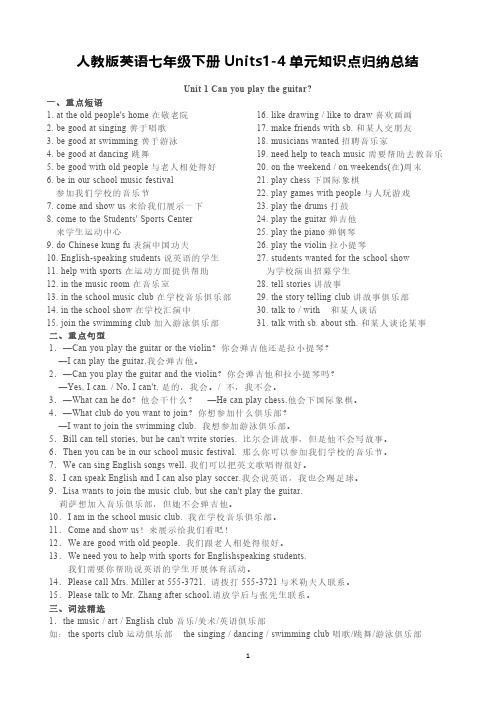
人教版英语七年级下册Units1-4单元知识点归纳总结Unit1Can you play the guitar?一、重点短语1.at the old people's home在敬老院2.be good at singing善于唱歌3.be good at swimming善于游泳4.be good at dancing跳舞5.be good with old people与老人相处得好6.be in our school music festival参加我们学校的音乐节e and show us来给我们展示一下e to the Students'Sports Center来学生运动中心9.do Chinese kung fu表演中国功夫10.English-speaking students说英语的学生11.help with sports在运动方面提供帮助12.in the music room在音乐室13.in the school music club在学校音乐俱乐部14.in the school show在学校汇演中15.join the swimming club加入游泳俱乐部16.like drawing/like to draw喜欢画画17.make friends with sb.和某人交朋友18.musicians wanted招聘音乐家19.need help to teach music需要帮助去教音乐20.on the weekend/on weekends(在)周末21.play chess下国际象棋22.play games with people与人玩游戏23.play the drums打鼓24.play the guitar弹吉他25.play the piano弹钢琴26.play the violin拉小提琴27.students wanted for the school show为学校演出招募学生28.tell stories讲故事29.the story telling club讲故事俱乐部30.talk to/with和某人谈话31.talk with sb.about sth.和某人谈论某事二、重点句型1.—Can you play the guitar or the violin?你会弹吉他还是拉小提琴?—I can play the guitar.我会弹吉他。
Unit1单元知识点归纳总结人教版七年级英语下册
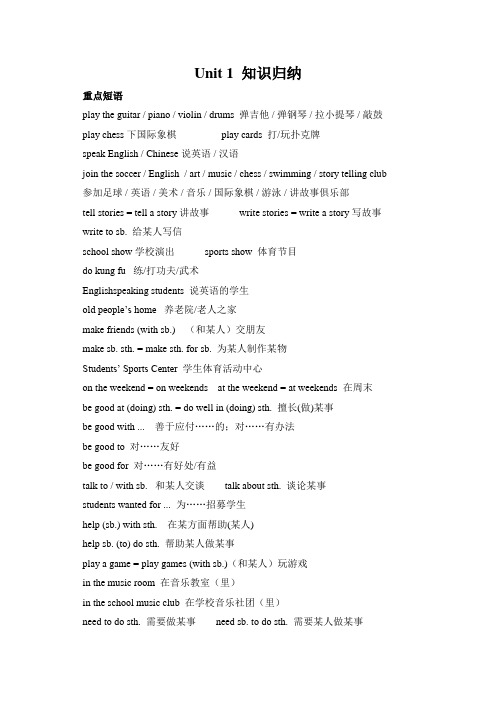
Unit 1 知识归纳重点短语play the guitar / piano / violin / drums 弹吉他 / 弹钢琴 / 拉小提琴 / 敲鼓play chess 下国际象棋play cards 打/玩扑克牌speak English / Chinese 说英语 / 汉语join the soccer / English / art / music / chess / swimming / story telling club 参加足球 / 英语 / 美术 / 音乐 / 国际象棋 / 游泳 / 讲故事俱乐部tell stories = tell a story 讲故事write stories = write a story 写故事write to sb. 给某人写信school show 学校演出sports show 体育节目do kung fu 练/打功夫/武术Englishspeaking students 说英语的学生old people’s home养老院/老人之家make friends (with sb.) (和某人)交朋友make sb. sth. = make sth. for sb. 为某人制作某物Students’ Sports Center学生体育活动中心on the weekend = on weekends at the weekend = at weekends 在周末be good at (doing) sth. = do well in (doing) sth. 擅长(做)某事be good with ... 善于应付……的;对……有办法be good to 对……友好be good for 对……有好处/有益talk to / with sb. 和某人交谈talk about sth. 谈论某事students wanted for ... 为……招募学生help (sb.) with sth. 在某方面帮助(某人)help sb. (to) do sth. 帮助某人做某事play a game = play games (with sb.)(和某人)玩游戏in the music room 在音乐教室(里)in the school music club 在学校音乐社团(里)need to do sth. 需要做某事need sb. to do sth. 需要某人做某事want to do sth. 想要做某事want sb. to do sth. 想要某人做某事show sb. sth.= show sth. to sb. 给某人看某物tell sb. sth.= tell sth. to sb. 告诉某人某事tell sb. to do sth. 告诉某人做某事tell sb. about sth. 告诉某人关于某事(的情况)teach sb. sth. 教某人某物teach sb. to do sth. 教某人做某事重点句型:含有情态动词can的肯定句,否定句,一般疑问句和特殊疑问句情态动词can: 表示能力,意为“_____/_____”,can的否定就是在其后加“______”,写作“___________/____”,情态动词后必须加“________”含有情态动词的肯定句变为否定句:()含有情态动词的肯定句变为一般疑问句:()句式结构语法知识1.辨析4个“说”2.构词法v.+er/or n. 与此动作相关的人或职业play()teach()swim()drive()write()dance()sing()read()work()speak()talk()练一练1.I can play the drums.(变为一般疑问句并做肯定回答)____________________________________________________________________________________________________2.Mr. Wu can’t speak English well.(变为肯定句)__________________________________________________3.Peter can dance and sing.(对划线部分提问)__________________________________________________4.Li Hua can help you with your math this morning.(对划线部分提问)__________________________________________________5.Li Hua can help you with your math this morning.(对划线部分提问)__________________________________________________6.Linda can go to the supermarket with her mom.(对划线部分提问)__________________________________________________7.Linda can go to the supermarket with her mom.(对划线部分提问)__________________________________________________8.You can ask Miss. Li for help.(对划线部分提问)__________________________________________________9. Can your friends finish their homework every day? (做肯定回答并变为陈述句)____________________________________________________________________________________________________10.Jim’s father can keep (保持 ) good eating habits. (对划线部分提问)__________________________________________________11.Can you tell me his phone number? (做否定回答并变为肯定句)____________________________________________________________________________________________________12.I can have 5 apples for lunch. (对划线部分提问)__________________________________________________13.I can buy a book for you. (变为一般疑问句并做否定回答)____________________________________________________________________________________________________14.Linda can play the violin well because she has a good violin teacher.(对划线部分提问)__________________________________________________15.I and my friend can get to Chengdu next week.(对划线部分提问)__________________________________________________16.Mike can play puter games and watch TV when his parents are not at home.(对划线部分提问)__________________________________________________17.Li Hua likes to join all kinds of(各种各样的)clubs because he wants to make friends. (对划线部分提问)__________________________________________________18.The students in the school can have lunch on the third floor(楼).(对划线部分提问)__________________________________________________19.The students in the school can have lunch on the third floor(楼).(变为一般疑问句并做否定回答)____________________________________________________________________________________________________20.Jason can play the erhu. (对划线部分提问)__________________________________________________。
- 1、下载文档前请自行甄别文档内容的完整性,平台不提供额外的编辑、内容补充、找答案等附加服务。
- 2、"仅部分预览"的文档,不可在线预览部分如存在完整性等问题,可反馈申请退款(可完整预览的文档不适用该条件!)。
- 3、如文档侵犯您的权益,请联系客服反馈,我们会尽快为您处理(人工客服工作时间:9:00-18:30)。
人教版英语七年级下册课堂练习-unit1
Unit 1Can you play the guitar?
单元知识背记手册
◇Section A重点单词1.guitar吉他
2.sing 唱歌
3.swim游泳
4.dance 跳舞;舞蹈
5.draw画
6.chess 国际象棋
7.speak说(某种语言);说话
8.join参加;加入
9.club 俱乐部;社团
10.tell讲述;告诉
11.story 故事;小说
12.write写作;写字
13.show演出;节目;给……看;展示
14.or或者;也不(用于否定句)
15.talk说话;交谈
◇Section A重点短语1.play chess下国际象棋
2.speak English 说英语
3.want to do sth.想要做某事
4.join the club加入俱乐部
5.be good at…擅长于……
6.tell stories讲故事
7.school show校园演出
8.talk to…跟……说
9.swimming club游泳俱乐部
10.kung fu(中国)功夫
◇Section B重点单词
1.drum 鼓
2.violin 小提琴
3.also也;而且
4.people 人;人们
5.home家;活动本部到家,在家
6.make 使成为;制造
7.today在今天
8.center 中心;中央
9.weekend周末
10.teach 教;讲授
11.musician音乐家
◇Section B重点短语
1.play the drums/piano/violin 敲鼓/弹钢琴/拉小提琴
2.be good with…善于应付……的;对……有办法
3.make friends结交朋友
4.help (sb.) with sth.在某方面帮助(某人)
5.on the weekend (在)周末
6.call sb.at…拨打……联系某人
7.Students' Sport Center学生运动中心
8.need sb.to do sth.需要某人做某事
9.play games with sb.和某人玩游戏
10.be in参加;成为……一员
◇词形变换
1.sing (动词)唱歌→singer (名词)歌手
2.teacher (名词)教师→teach (动词)教;讲授
3.music (名词)音乐→musician (名词)音乐家
4.swim (动词)游泳→swimming (动名词)游泳
5.week (名词)星期→weekend (名词)周末
6.and (用于肯定句)和→or (用于否定句)或者;也不
◇重点句型
1.—Can you swim?你会游泳吗?
—Yes,I can./No,I can't.是的,我会。
/不,我不会。
2.—What can you do?你会做什么?
—I can dance.我会跳舞。
3.—What club do you want to join?你想参加什么俱乐部?
—I want to join the chess club.我想参加象棋俱乐部。
4.—You can join the art club.你可以加入艺术俱乐部。
—Sounds good.听起来不错。
5.You're very good at telling stories.你很擅长讲故事。
6.They can tell you stories,and you can make friends.他们会给你讲故事,你又可以交朋友。
7.I like to play basketball.我喜欢打篮球。
8.Then we need you to help with sports for English speaking students.那么我们需要你帮助说英语的学生开展体育活动。
9.Are you good with old people?你善于跟老人打交道吗?
10.The school needs help to teach music.这所学校需要帮助来教音乐。
11.Please call us at 6897729 today!请在今天拨打6897729联系我们。
